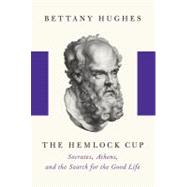
Note: Supplemental materials are not guaranteed with Rental or Used book purchases.
Purchase Benefits
What is included with this book?
| Acknowledgements | p. xiii |
| Preface | p. xv |
| Introduction | p. xvii |
| The dramatic story of Socrates - sources and approach | p. xxiii |
| Dramatis personæ | p. xxvii |
| List of Illustrations | p. xxxi |
| Maps | p. xxxvi |
| Athena's City | |
| The water-clock: time to be judged | p. 1 |
| Athena's city | p. 8 |
| Socrates in the Agora | p. 21 |
| The Stoa of the King | p. 27 |
| The first blood sacrifice | p. 36 |
| Checks, balances and magic-men | p. 41 |
| Persuade or obey | p. 45 |
| Peitho, the power of persuasion | p. 52 |
| Socrates as a Young Man | |
| Alopeke: a philosopher is born | p. 59 |
| Kerameikos - potters and beautiful boys | p. 69 |
| Pericles: high society, and democracy as high theatre | p. 78 |
| Delos - and the birth of an empire | p. 87 |
| Purple ambition | p. 91 |
| Paddling in the river, sweating in the gym: Socratic youth | p. 101 |
| Gym-hardened fighting men | p. 106 |
| 'Golden Age' Athens | p. 111 |
| Aspasia - Sophe Kai Politike, Wise and Politically Astute | p. 116 |
| Socrates the Soldier | |
| Samos | p. 127 |
| Flexing muscles | p. 135 |
| Socrates the soldier | p. 141 |
| Demons and virtues | p. 147 |
| The plague | p. 154 |
| New Gods, New Possibilities: Socrates in Middle Age | |
| Silver Owls and a wise owl | p. 161 |
| Hot air in the Agora | p. 166 |
| Democracy, liberty and freedom of speech | p. 177 |
| The good life - after dark | p. 184 |
| Delphi, the Oracle | p. 187 |
| Gnothi Seauton - Know Yourself | p. 193 |
| Aristocrats, democrats and the realities of war | p. 196 |
| The Fight Goes on | |
| The Peloponnesian War, phase two - a messy siege | p. 205 |
| Brickbats and bouquets | p. 211 |
| Amphipolis | p. 220 |
| Socrates and Love | |
| Socrates in the symposium | p. 229 |
| The trouble with love | p. 236 |
| Oh, tell me the truth about love | p. 239 |
| Diotima - a very social priestess | p. 242 |
| Little Bears | p. 247 |
| Xanthippe | p. 254 |
| Alcibiades: violet-crowned, punch-drunk | p. 258 |
| Cutting Down the Tallest Corn | |
| Melos | p. 267 |
| Venus de Milo abused | p. 271 |
| Priest of nonsense: playing with fire | p. 273 |
| Sicily | p. 279 |
| Rivers of blood | p. 286 |
| Decelea - closing down the mines | p. 290 |
| Time of terror | p. 294 |
| Arginusae - standing out in the crowd | p. 305 |
| Tall poppies, cut corn | p. 311 |
| Thirty Tyrants | p. 318 |
| The Trial and Death of Socrates | |
| The scapegoat | p. 329 |
| An apology | p. 333 |
| Twilight and Delos at dawn | p. 339 |
| Socrates bound | p. 343 |
| Flight from the world | p. 353 |
| Coda: The tomb of Socrates - the Tower of the Winds | p. 357 |
| Afterword | p. 361 |
| Honouring Aphrodite | p. 363 |
| Mysteria - the Eleusinian Mysteries | p. 368 |
| Timeline | p. 372 |
| Text Acknowledgements | p. 380 |
| Image Acknowledgements | p. 385 |
| Notes | p. 388 |
| Bibliography | p. 438 |
| Index | p. 473 |
| Table of Contents provided by Ingram. All Rights Reserved. |
The New copy of this book will include any supplemental materials advertised. Please check the title of the book to determine if it should include any access cards, study guides, lab manuals, CDs, etc.
The Used, Rental and eBook copies of this book are not guaranteed to include any supplemental materials. Typically, only the book itself is included. This is true even if the title states it includes any access cards, study guides, lab manuals, CDs, etc.